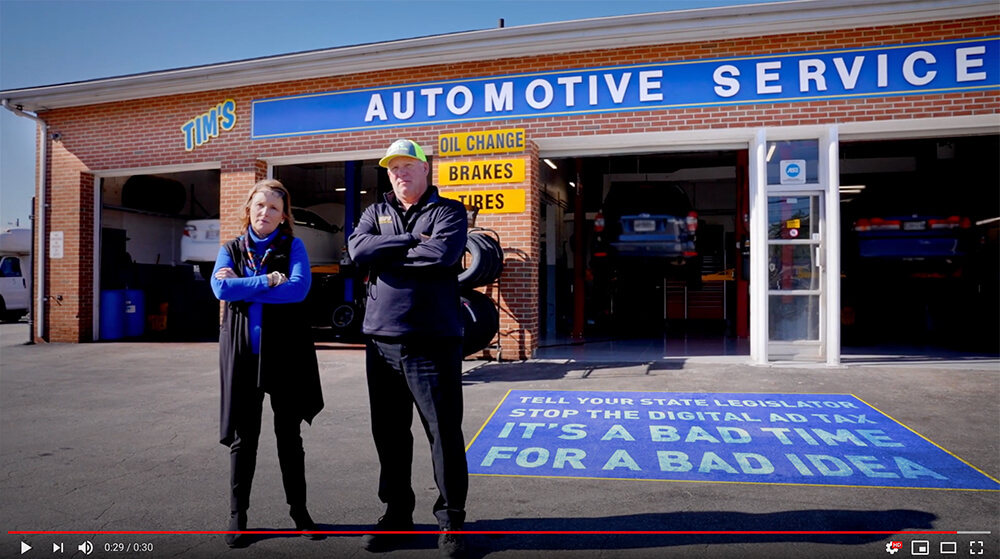


ANNAPOLIS, MD (November 10, 2020) – Marylanders For Tax Fairness, an independent coalition of Marylanders, businesses of all sizes, and pro-economic growth advocates, today announced its official formation, initial membership, and outlined its collective mission to sustain Governor Larry Hogan's veto of House Bill 732, the Digital Advertising Tax. Currently, the coalition is comprised of nearly 100 businesses, organizations, and individuals who have joined together to fight against unfair taxes thrust upon the state's leading job creators in the middle of a worldwide pandemic and the worst possible time in modern history.
Starting today, Marylanders For Tax Fairness will be working to persuade the Maryland General Assembly to allow Governor Hogan's veto of House Bill 732 to stand when the 2021 legislative session begins in January. The non-partisan Department of Legislative Services (DLS) has estimated that House Bill 732 will cost Maryland taxpayers $250 million every year. "The reality is that Marylanders and Maryland businesses will be the ones who will end up paying this tax and given the current COVID-19 crisis, that is unconscionable," said Doug Mayer, spokesman for Marylanders For Tax Fairness. "This is a bad time for a bad idea, and we are respectfully asking the Maryland General Assembly to reconsider their support for this new tax on job creators. Maryland entrepreneurs and small businesses are doing everything they can to survive the pandemic. The last thing they need is another tax and additional costs making it even harder than it already is."
At the very end of the 2020 Maryland legislative session, the General Assembly rushed House Bill 732 - Digital Advertising Gross Revenues Tax, a very shortsighted and deeply flawed bill, to the floor where it passed along party lines. The COVID-19 pandemic cut short the regular legislative session and public input was limited. The outcome was a bill that will raise taxes on every person and business that advertises their services online. By overriding the governor’s veto, Maryland would have the notorious distinction of being the only state in the country to enact a digital advertising tax.
“This tax will be devastating to local news organizations and small businesses, who are reeling from the COVID-19 pandemic,” said Rebecca Snyder, executive director of the MDDC Press Association, which represents news media organizations in Maryland, Delaware and DC. “Taxing digital ads – or any type of advertising – raises the cost of ads for small businesses who are already stretched too thin.”
“Although this looks like a tax applicable to only large companies, businesses and consumers should not be fooled,” said Cailey Locklair, President, Maryland Retailers Association. “Ultimately, small businesses will bear this cost and consumers at the end of the day will pay for it.”
Today, businesses of all sizes are marketing online. Access to platforms that provide advertising is direct, easy to manage, and more people than ever are on those platforms. This is why House Bill 732 is damaging to both Maryland’s and countless local economies - as it’s not just Fortune 500 companies that advertise online. From the local nail salon to the local automotive repair shop, businesses of all sizes advertise their services and products online. The Digital Ad Tax would raise taxes and the cost of doing business for all these hardworking Marylanders, and the ripple effect is obvious: higher taxes, higher prices, fewer jobs.
“One thing is certain, the economic burden of this tax will ultimately be borne by Maryland businesses and consumers,” said Christine Ross, President & CEO of the Maryland Chamber of Commerce. “Maryland job creators continue to struggle with economic uncertainty while trying to maintain operations and serve the communities where they live and work. We should be doing all that we can to support them in overcoming the consequences of a global pandemic, not adding to their stress by increasing the cost of doing business in our state.”
“The fact is small business owners and their customers will wind up paying this tax,” said Mike O’Halloran, State Director of NFIB in Maryland, the state’s leading small business advocacy organization. “And this coming at a time when small businesses are turning more and more to the internet and social media platforms to get their names out there in front of a tech-driven customer base. Our members should not be the first in the nation to pay a new tax when they’re struggling to keep the doors open and Marylanders employed.”
Marylanders or Maryland businesses interested in joining this coalition are encouraged to do the following:
Media contact
Doug Mayer
doug@marylandtaxfairness.org
-###-